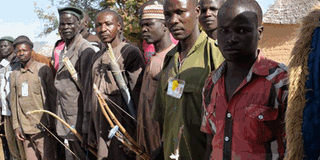Nigerian minister claims Boko Haram ‘largely’ defeated

A picture taken on February 16, 2015 shows members of self-appointed vigilance committee hunting down and fighting Boko Haram Islamic group, standing in the village of Lding Lding, northern Cameroon. Nigeria’s information minister has insisted that Boko Haram was “largely defeated” despite two days of bombings blamed on the jihadist group that left over 50 dead in the volatile northeast. PHOTO | REINNIER KAZE
What you need to know:
- Nigeria’s information minister on Tuesday insisted that Boko Haram was “largely defeated” despite two days of bombings blamed on the jihadist group that left over 50 dead in the volatile northeast.
- Over 50 people were killed in a 48-hour wave of attacks blamed on Boko Haram jihadists in northeastern Nigeria, sources said yesterday, days ahead of the government’s deadline to stamp out the group.
- Nigerian President Muhammadu Buhari pledged to end the insurgency by December 31, saying on Thursday his government had “technically” defeated Boko Haram and reduced the group’s capacity to mount “conventional” attacks in Africa’s most populous nation.
- Analysts say the Christmas attacks are a “damaging” set back for Buhari, who was voted into power in May on a platform promising to tackle the Boko Haram threat.
LAGOS, Tuesday
Nigeria’s information minister on Tuesday insisted that Boko Haram was “largely defeated” despite two days of bombings blamed on the jihadist group that left over 50 dead in the volatile northeast.
Mr Lai Mohammed maintained the Nigerian government had greatly reduced the group’s capacity to attack and was on its last week.
“Boko Haram has been largely defeated. They (Boko Haram) know they are on their way out,” Mohammed told journalists in Lagos.
“They lack the capacity to launch horrendous attacks they used to do in the past. We have succeeded in dislodging them,” he said.
“Our problem now is how to resettle the internally displaced people.”
WAVE OF ATTACKS
Over 50 people were killed in a 48-hour wave of attacks blamed on Boko Haram jihadists in northeastern Nigeria, sources said yesterday, days ahead of the government’s deadline to stamp out the group.
Nigerian President Muhammadu Buhari pledged to end the insurgency by December 31, saying on Thursday his government had “technically” defeated Boko Haram and reduced the group’s capacity to mount “conventional” attacks in Africa’s most populous nation.
But in an expected show of defiance, Boko Haram countered with a series of devastating attacks on towns in the country’s northeast, claiming dozens of fatalities in a bloody killing spree that began Christmas Day.
Riding astride bicycles, fighters invaded Kimba village in Borno state - a Boko Haram stronghold - Friday, shooting and killing at least 14 residents before torching their homes.
Two days later, the militants launched rocket-propelled grenades and used a small army of suicide bombers, killing 22 people in the key northeastern city of Maiduguri, the spiritual home of the insurgency.
“There have been more than a dozen suicide blasts in Maiduguri between last night and this morning,” Mr Babakura Kolo, a civilian vigilante assisting the military in fighting Boko Haram, told AFP on Monday.
“The suicide attacks were carried out by young suicide bombers who managed to make their way into the city during the gun battle between soldiers and Boko Haram gunmen last night.”
Further attacks rocked the town of Madagali in Adamawa state Monday, when two young female suicide bombers detonated their explosives in a busy market, killing a reported 30 people.
DAMAGING TO BUHARI
Analysts say the Christmas attacks are a “damaging” set back for Buhari, who was voted into power in May on a platform promising to tackle the Boko Haram threat.
“Saying Boko Haram is ‘technically’ defeated in a period where the organisation is historically very active - Christmas - could only make him look bad,” Yan St-Pierre, terrorism analyst at Berlin-based Modern Security Consulting Group, told AFP.
“President Buhari’s credibility and popularity will be greatly damaged by this,” St-Pierre said.
“Boko Haram is still extremely dangerous, and it’s gaining resources, notoriety, credibility and successfully expanding its reach,” St-Pierre said.
In their quest to create an independent Islamic state, the insurgents have been carrying out deadly cross-border raids in neighbouring Chad, Cameroon and Niger, fuelling fears that the hard-line Muslim movement is growing into a regional jihadist threat.
“While the Nigerian government may have succeeded in dislodging the sect from territory it assimilated and controlled since July 2014, Boko Haram has by no means been defeated,” Mr Ryan Cummings, security analyst at Red24, a risk consultancy firm, said.





